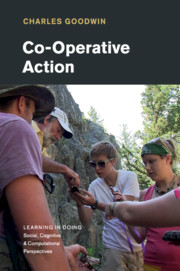Book contents
- Co-Operative Action
- Learning in Doing: Social, Cognitive and Computational Perspectives
- Co-Operative Action
- Copyright page
- Dedication
- Contents
- Figures
- Acknowledgments
- 1 What Is Co-Operative Action, and Why Is It Important?
- Part I Co-Operative Accumulative Action
- Part II Intertwined Semiosis
- Part III Embodied Interaction
- Part IV Co-Operative Action with Predecessors
- Part V Professional Vision, Transforming Sensory Experience into Types, and the Creation of Competent Inhabitants
- References Cited
- Index
- Series page
Part I - Co-Operative Accumulative Action
Published online by Cambridge University Press: 03 November 2017
- Co-Operative Action
- Learning in Doing: Social, Cognitive and Computational Perspectives
- Co-Operative Action
- Copyright page
- Dedication
- Contents
- Figures
- Acknowledgments
- 1 What Is Co-Operative Action, and Why Is It Important?
- Part I Co-Operative Accumulative Action
- Part II Intertwined Semiosis
- Part III Embodied Interaction
- Part IV Co-Operative Action with Predecessors
- Part V Professional Vision, Transforming Sensory Experience into Types, and the Creation of Competent Inhabitants
- References Cited
- Index
- Series page
Summary
Utterances typically emerge within webs of unfolding co-operative action, a process that has deep consequences for how the practices used to construct and modify them are mastered. The rich, creative language of African-American children as they playfully argue on the street provides a vivid demonstration. The patterned organization of a current utterance provides a subsequent speaker with a trove of resources for building a relevant response to it. New, quite different action (e.g, strong opposition to the talk being responded to) can be constructed by decomposing the earlier utterance(s) into parts that can be reused with transformation, rearranged, and supplemented. The dialogic syntax (DuBois 2014) found here has strong implications for how the practices required to build utterances are mastered through co-operative action. Reuse with transformation of structures made publicly available through the actions of earlier actors leads to the progressive accumulation, with locally relevant modification, of structure inherited from predecessors, a process that sits at the heart of human action.
* * *
- Type
- Chapter
- Information
- Co-Operative Action , pp. 21 - 90Publisher: Cambridge University PressPrint publication year: 2017

